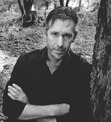The Sad Truth
Since May, I've been visited regularly by a recurring image. It is one my own mind has made, but around a skeleton of words I read in a BBC news article.
It's been a busy old year, with writing, editing, copy-editing and launching The Broken Ones, along with other work for beyondblue and some (very fun!) television story development. But in quiet moments – and I don't get as many as one might imagine – my mind goes back to this article, and this image. I've been meaning to write about it, but haven't quite known what to say. So, perhaps the thing to do is simply spill it, confess that I am shackled to it and will be forever, and maybe one of you can help make sense of it for me. I don't think you will, though, because ... you'll see.
The article was about Samuel Willenberg, an 87 year old survivor of Treblinka. One of far, far too few. He expresses some of his memories through his art. Here is a passage from the middle of the article:
"In the basement of (Willenberg's) apartment building is a collection of bronze sculptures, created by Mr Willenberg to reflect his experiences in Treblinka and to preserve the memory of those who died. One is of a girl with her head half-shaved. Another shows a father helping his son take off his shoes before being sent to the gas chamber. On the wall are his drawings of the camp."
My throat tightens when I read it, and my eyes sting. When my brain is untenanted by a particular job or thought, sometimes this passage will fly into it like some dark thing. And stay a while.
The last act of a father was to lovingly help his son remove his shoes.
I have a son and a daughter. I adore them more than life; they, and my wife, are my life. I'd give my life for them. But this father could not give his life for his son. I'm sure he wanted to teach his boy so much – how to eat, to speak, to dress, to read, to mend things, to move in the world ... but that was stolen, and all he could do, this last act of love in a shockingly black and loveless time, was to help his boy remove his shoes.
This double murder breaks my heart. But murders like these occurred millions of times. These that Willenberg witnessed happened in my father's lifetime; millions more have died by violence in my own lifetime, in Uganda, Cambodia, Rwanda, and Bosnia. It is so easy to forget, because – where I live – we feel so safe, so lucky. So very, very lucky. It annoys me when people grumble about the trouble of having to go to the polls on voting day (for those of you outside Australia, voting is compulsory here and I am so very glad it is). As my wife says, it is a privilege to vote; it is a privilege to have a say in your own destiny. Earlier this year we saw people risk their lives in Egypt and Libya and Tunisia for the right to vote – here, people grumble about finding a car park on election day. The alternative is not far away – not in time, not in hateful hearts.
I've been accused of writing some terrible things in my books. Most recently, I was mildly rebuked for describing in overmuch detail the death of a horse (this despite the fact that, elsewhere in the book, disabled children are vanished and murdered). Yes, I write about crimes. But the perpetrators are, in the convention of satisfying storytelling, very often brought to some kind of justice. Most importantly, I write fiction. Nothing I write could be more horrifying than the truth of what happened at Treblinka, Auschwitz, or Chelmno, or Srebrenica or the Killing Fields.
I've decided it's okay to cry about these things. The worry would be not crying.
You can read the BBC article here. I hope Samuel Willenberg finds pe



